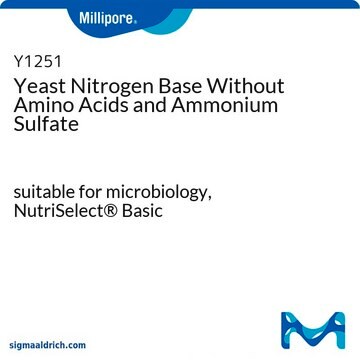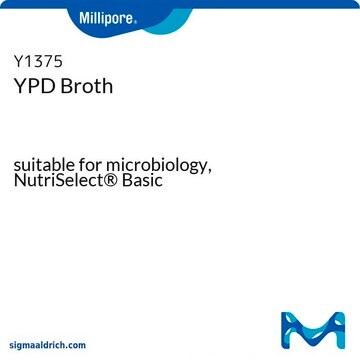Y3627
Yeast Carbon Base
suitable for microbiology, NutriSelect® Basic
About This Item
Recommended Products
sterility
non-sterile
Quality Level
form
powder
manufacturer/tradename
NutriSelect® Basic
technique(s)
microbe id | utilization test: suitable
microbiological culture: suitable
application(s)
clinical testing
food and beverages
life science and biopharma
microbiology
storage temp.
2-8°C
suitability
nonselective for Candida spp.
nonselective for Pichia spp.
nonselective for Saccharomyces spp.
nonselective for Zygosaccharomyces spp.
Application
Components
Dextrose, 10.00
L-Histidine hydrochloride, 0.001
DL-Methionine, 0.002
DL-Tryptophan, 0.002
Biotin, 0.000002
Calcium pantothenate, 0.0004
Folic acid, 0.000002
Inositol, 0.002
Niacin, 0.0004
p-Amino benzoic acid, 0.0002
Pyridoxine hydrochloride, 0.0004
Riboflavin (Vitamin B2), 0.0002
Thiamine hydrochloride, 0.0004
Boric acid, 0.0005
Coppers sulfate, 0.00004
Potassium iodide, 0.0001
Ferric chloride, 0.0002
Manganese sulfate, 0.0004
Sodium molybdate, 0.0002
Zinc sulfate, 0.0004
Monopotassium phosphate, 1.00
Magnesium sulfate, 0.50
Sodium chloride, 0.10
Calcium chloride, 0.10
Preparation Note
Prepare the broth base at 10 x concentration by dissolving 11.7 grams of Yeast Carbon Base in 100 mL of distilled water. Add the appropriate nitrogen source. Warm if necessary to dissolve the medium completely. Sterilize by filtration.
B. Detection of yeasts, other than Saccharomyces cerevisae
Dissolve 2.35 grams of Yeast Carbon Base in 100 mL of distilled water.
C. Detection of wild yeasts in beer and other brewing components
Add 0.33 g of ammonium sulphate (Catalog No. A2939) and 4 g of bacteriological agar (Catalog No. A5306) to base B. Sterilize by autoclaving at 15 lbs pressure (121°C) for 15 minutes.
Footnote
The designations basic, plus, or prime are added to indicate the quality control level, from basic quality control to standard QC plus to prime for full regulatory compliance.
Legal Information
Storage Class Code
11 - Combustible Solids
WGK
WGK 2
Flash Point(F)
Not applicable
Flash Point(C)
Not applicable
Personal Protective Equipment
Certificates of Analysis (COA)
Search for Certificates of Analysis (COA) by entering the products Lot/Batch Number. Lot and Batch Numbers can be found on a product’s label following the words ‘Lot’ or ‘Batch’.
Already Own This Product?
Find documentation for the products that you have recently purchased in the Document Library.
Customers Also Viewed
Articles
Traditional methods are based morphology, staining methods, enzyme reactions (metabolism) and diverse media.
Protocols
Yeast culture techniques: Model systems for eukaryotic studies with liquid media or agar plate growth.
Yeast culture techniques: Model systems for eukaryotic studies with liquid media or agar plate growth.
Yeast culture techniques: Model systems for eukaryotic studies with liquid media or agar plate growth.
Yeast culture techniques: Model systems for eukaryotic studies with liquid media or agar plate growth.
Our team of scientists has experience in all areas of research including Life Science, Material Science, Chemical Synthesis, Chromatography, Analytical and many others.
Contact Technical Service














